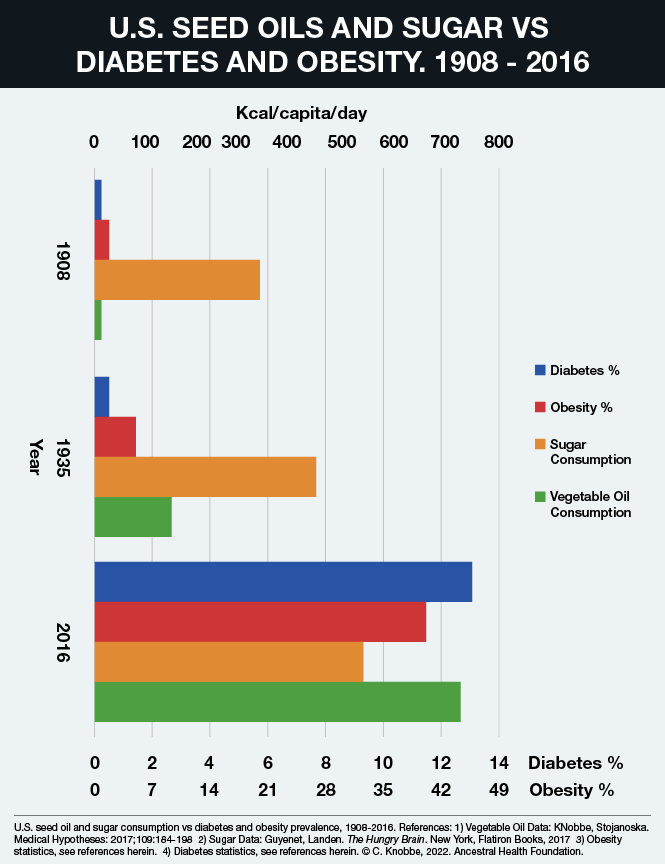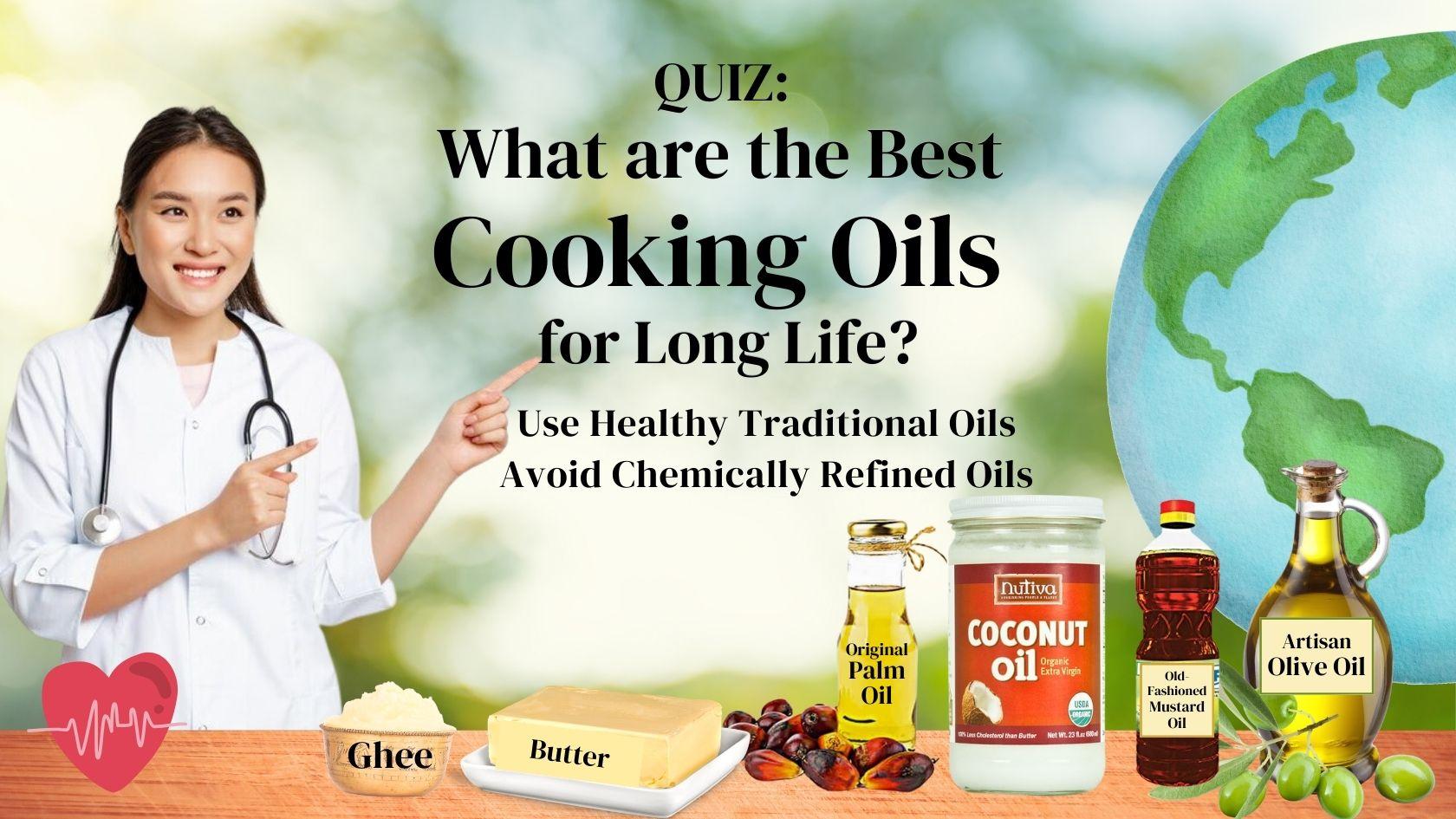
Rising chronic disease is a global pandemic. What is causing the continuous increase heart disease, cancer, and diabetes? Could the refined oils we eat be a factor in rising disease and accelerated aging? These new oils were recently developed and marketed to the world. Ever since their introduction, we see rising disease incidence. and lower healthy living expectancy. Do you trust your life and your family’s health to the global food industry? Could money and selfish interest drive marketing worldwide? We have the power to learn, to understand, and to make our own healthy choices.
Summary Takeaway:
- Choosing your FAT is Important, ESPECIALLY for the brain: The human brain is approximately 60 % fat. When we eat the best fats, we optimize childhood development, brain function, and longevity. Which oils are best?
- Eat Traditional Oils LOWEST in Linoleic acid. Best oils are Grass-fed Butter, Ghee, Coconut, Avocado, Mustard, Artisan Olive oil, Palm oil, and Lard. These are the oils of our great grandmothers, and in their time, illnesses like diabetes, liver cancer, and heart disease were rare.
- How does Linoleic Acid in Refined Oils Destroy your Health? Linoleic Acid in refined and GMO seed oils is a primary contributor to a rising global epidemic of chronic disease, including heart disease, cancer, and diabetes. How do you protect your DNA from synthetic foods?
- AVOID Refined Vegetable Oils HIGH in Linoleic Acid: Avoid Corn, Soy, Refined, Canola, Margarine, Safflower, Grapeseed, Sunflower, Commercial Olive oil, Sesame, Rice Bran, and Peanut Oil.
- Chemical extraction of all seed oils at high heat creates a toxic food. Avoid Refined Seed Oils!
- What’s Your Oil Smoke Point? Does Deep-Frying Cause Cancer? YES. Know the smoke point of your cooking oil, and never burn it. Frying destroys nutrients in food. It’s better to steam, boil, bake, or low-temperature stir-fry. Never reuse your oil after cooking.
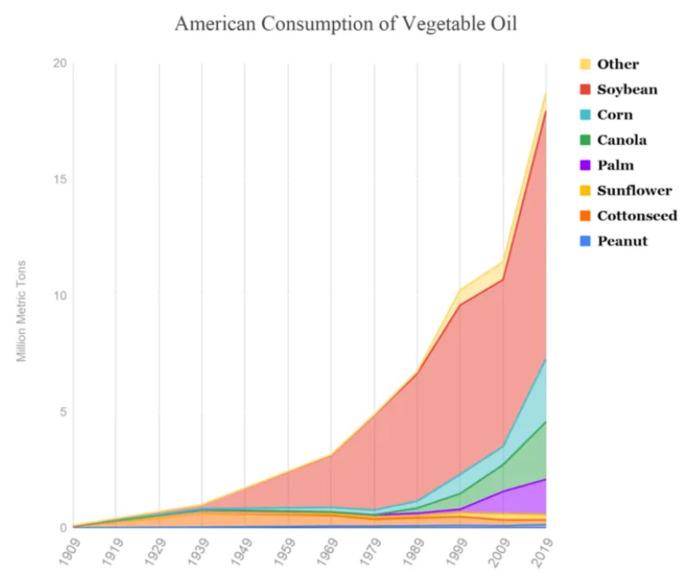
1. Choosing Your FAT is important, ESPECIALLY for the brain:
The human brain is approximately 60 % fat. When we eat the best fats, we optimize childhood development, nerve function, and longevity. Which oils are best?
Very recent science now indicates that old-fashioned saturated fats and animal fats are beneficial to health. On the other hand, newly invented refined oils may cause increasing chronic illness such as heart disease, inflammation, and cancer. In this article we will focus on two polyunsaturated fats (PUFAs). These two essential PUFAs are (1) Beneficial Omega-3 fats which are low in linoleic acid, and (2) Harmful Omega-6 fats, high in linoleic acid (LA).
The brain is very high in omega-3 fats which support brain function, strong child development, and slow aging. We need plenty of omega-3 fats in our diet for healthy membrane growth and flexible nerve synapses. However, new refined omega-6 cooking oils high in linoleic acid (LA), suppress normal child development, brain function, causing accelerated brain aging.
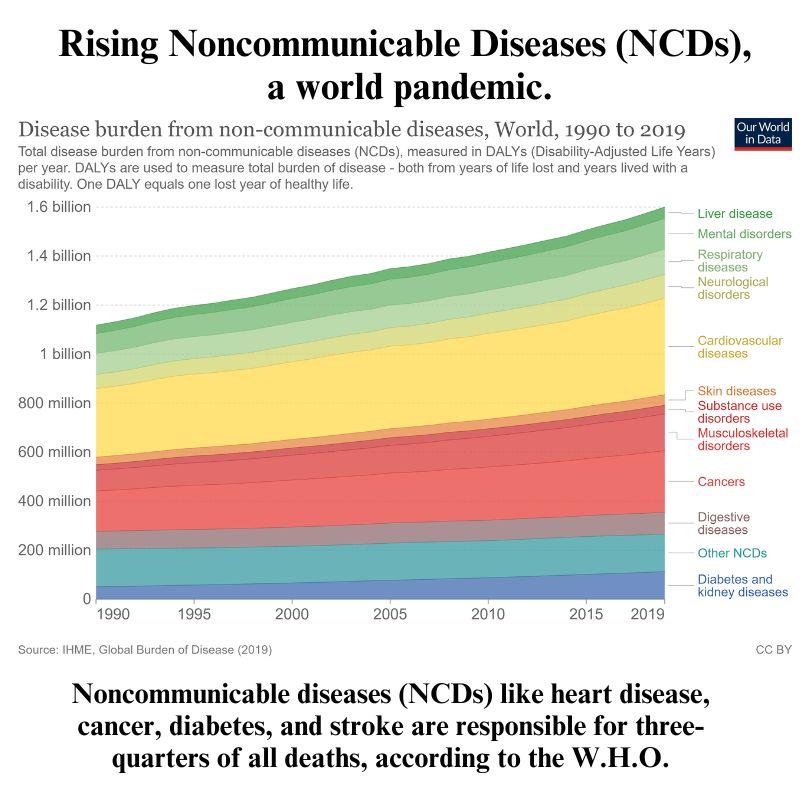
In the last 50 years, major changes in world food distribution have caused a rapid increase in inexpensive refined oils high in linoleic acid. Many people are choosing these cheap seed oils. As a result, most of the population is deficient in healthy omega-3 fats. At the same time, with worldwide diets high in LA, we see rising cancer, inflammation, Alzheimer’s disease, and dementia.
Research shows that a diet low in LA can protect the brain against inflammation, aging, and even reduce migraine headaches. Further studies are needed to improve neuro-development and create dietary recommendations that optimize neurological health at all ages from infants to the elderly.
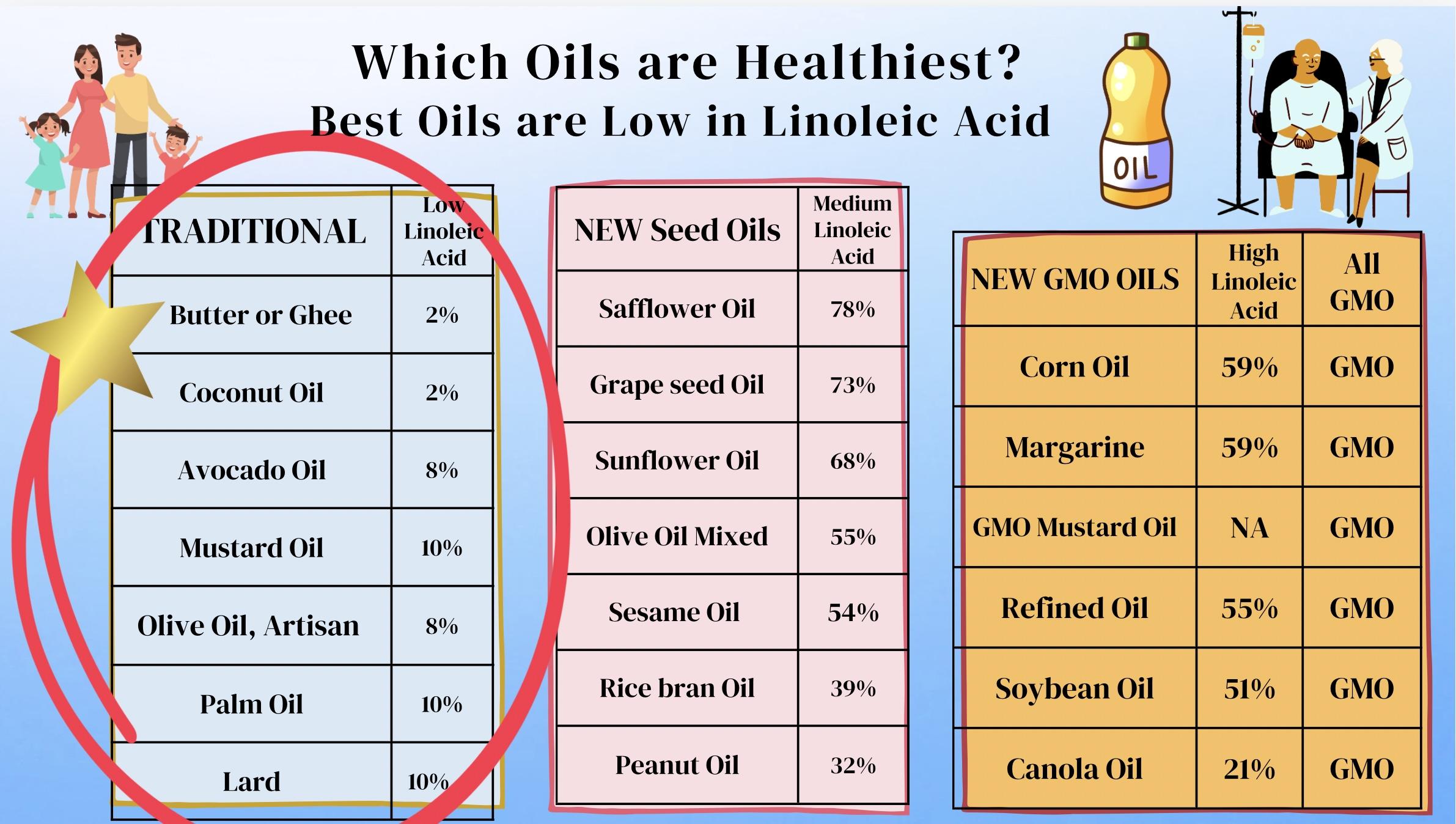
2. Eat Traditional Oils LOWEST in Linoleic acid.
Best oils are Grass-fed Butter, Ghee, Coconut, Avocado, Mustard, Artisan Olive oil, Palm oil, and Lard.
- Coconut Oil – A very healthy oil for skin, diet, and for weight loss. Coconut oil contains the lowest linoleic acid content with countless health-promoting and anti-cancer properties and helps to stabilize blood sugar. Many people use coconut oil to treat Alzheimer’s disease, to reduce the risk of heart disease, to improve digestion, and protect against inflammation. Pure coconut oil can do more for your health than the top ten leading health foods and cosmetics combined. For this reason, it can rightfully claim the title as the world’s most powerful superfood.
- Grass-fed Butter – Butter is another delicious superfood that is extremely low in linoleic acid. Use it to sauté, bake, spread, or melt on foods. Some people avoid butter because they’re concerned about calories in butter fat. However butter does not cause weight gain, and it has no carbs! Overall, butter from grass-fed cows is far healthier than grain-fed butter.
- Ghee is clarified butter, nutritionally similar to butter, with milk solids removed. It has a higher smoke point than butter, so more stable in high temperature cooking and frying. Ghee is less likely to become rancid, so it stores well. and is traditional in Indian dishes.
- Avocado Oil: This very healthy oil comes from the avocado flesh, not the seed. Use it for salad dressings and light cooking, but make sure it is cold pressed!
- Mustard Oil has a distinctive, pungent taste. It comes from seeds of the brassica family, the same family as rapeseed, canola oil. Three types of Brassica nigra (black mustard), alba (white) and juncae (brown) are all used to produce mustard seed oil. Mustard Oil will surprise you with its many healing qualities: It boosts Cardiac Health, Contains Antibacterial and Antifungal Properties, Benefits the Skin, Improves Hair Health, Reduces inflammation, Relaxes the nerves, and increases blood circulation It even treats Gum Disease. Massage mustard oil into the gums with a little salt for five minutes two times per day over a period of three months. Mustard Oil is a traditional ingredient in Bhutan, Eastern India and Bangladesh — however, in the late 20th century, its popularity declined with the availability of cheap refined mass-produced vegetable oils.
- Artisan Olive Oil comes from pressing the olive fruit flesh, not the olive seed. So it is not a seed oil. Use it for salad dressing, healthy garnish, light cooking, and be sure it is real extra virgin olive oil. Sadly, many oil manufacturers blend olive oil with a tasteless refined oil such as canola, corn, or soy. In Bhutan, a traditional oil is called Pangtse Makhu, produced by small farms in Punakha, Bhutan. Pangtse Makhu is a delicious oil and extremely healthy. It is made from the fruit of the Sapphire Berry tree (Symplocos paniculata). The oil is traditionally extracted from the fruit using a gentle heat and pressing. It tastes yummy, something like olive oil.
- Palm oil – is a traditional oil used for thousands of years in Africa and Asia. It is safe and stable for cooking. Made from the fruit of the oil palm tree (Elaeis guineensis), it is one of the most widely produced edible fats in the world. And it is used in many cosmetics. The oil palm yields two types of oil: 1) Palm Oil is extracted from the flesh of the fruit. 2) Palm kernel oil is extracted from the seed, or kernel.
I consider palm oil a healthy fat as long as it is not overly refined. It is not a seed oil, as it is pressed from the fruit. This is the oil that food manufacturers should be using.
-
Palm oil is consumed in many countries as liquid oil, semi-solid shortening, and margarine. In the United States, palm oil is not widely used. Palm oil is semisolid at room temperature but can be processed into a liquid cooking oil.
Palm oil got a bad rep since it is high in saturated fat, long falsely demonized as a health risk. The palm tree is prolific, easy to harvest, takes very little work to grow, so it’s by far the most inexpensive oil to produce. This creates huge competition for new GMO oils. Marketing hype would have us believe Palm oil causes deforestation. But when we look deeper we find deforestation is caused by GMO seed companies planting corn, soy, and canola used in biofuel, motor oil, and animal feed, for hungry cows that burp. Excuse me, cows prefer to eat grass – they don’t even care for grains. Check out the international palm oil market and you’ll find misinformation exacerbated by government price controls, changing tariffs, and preferential distributor treatment.
Given Palm Oil’s health advantages and low price, maybe it’s time to take another look at this healthy alternative to rising disease caused by refined oils.
- Lard – Let’s talk about Lard and Bacon fat. One hundred years ago, Americans used lard from pork for pie crusts, cakes, and all types of cooking. In Italian cuisine, fresh lard is a delicacy. Lard is a good sources of vitamins A and K. It’s a good stable fat for cooking and frying.
3. How does Linoleic Acid in Refined Seed Oils Destroy your Health?
Linoleic acid (LA) makes up the bulk — about 60% to 80% — of omega-6 fats. Linoleic Acid in refined seed oils is the primary contributor to nearly all chronic disease, including heart disease, cancer, and diabetes. How do you protect your DNA from synthetic foods?
“The recent increase in highly inflammatory refined Omega-6 oils has led to an epidemic of chronic disease worldwide.” Dr. Mark Hyman
Although it is considered an essential fat, if too much is consumed, LA acts as a metabolic poison. This can lead to some very nasty outcomes, such as liver failure or diabetes.
PUFA fats high in LA are highly susceptible to oxidation, which means the fat breaks down into harmful subcomponents. The worst harm comes from OXLAMS (oxidated LA metabolites), cause much of the damage, such as liver cancer, rheumatoid arthritis, or atherosclerosis,
Over the last 150 years, the LA in the human diet has increased from about 2 to 3 grams a day to 30 or 40 grams. LA was once 1% to 3% of the energy in the human diet, but now it makes up 15% to 20%. In Bhutan and India where people consume high amounts of refined seed oils, the percentage is even higher. We see rising obesity, insulin resistance, and heart disease.
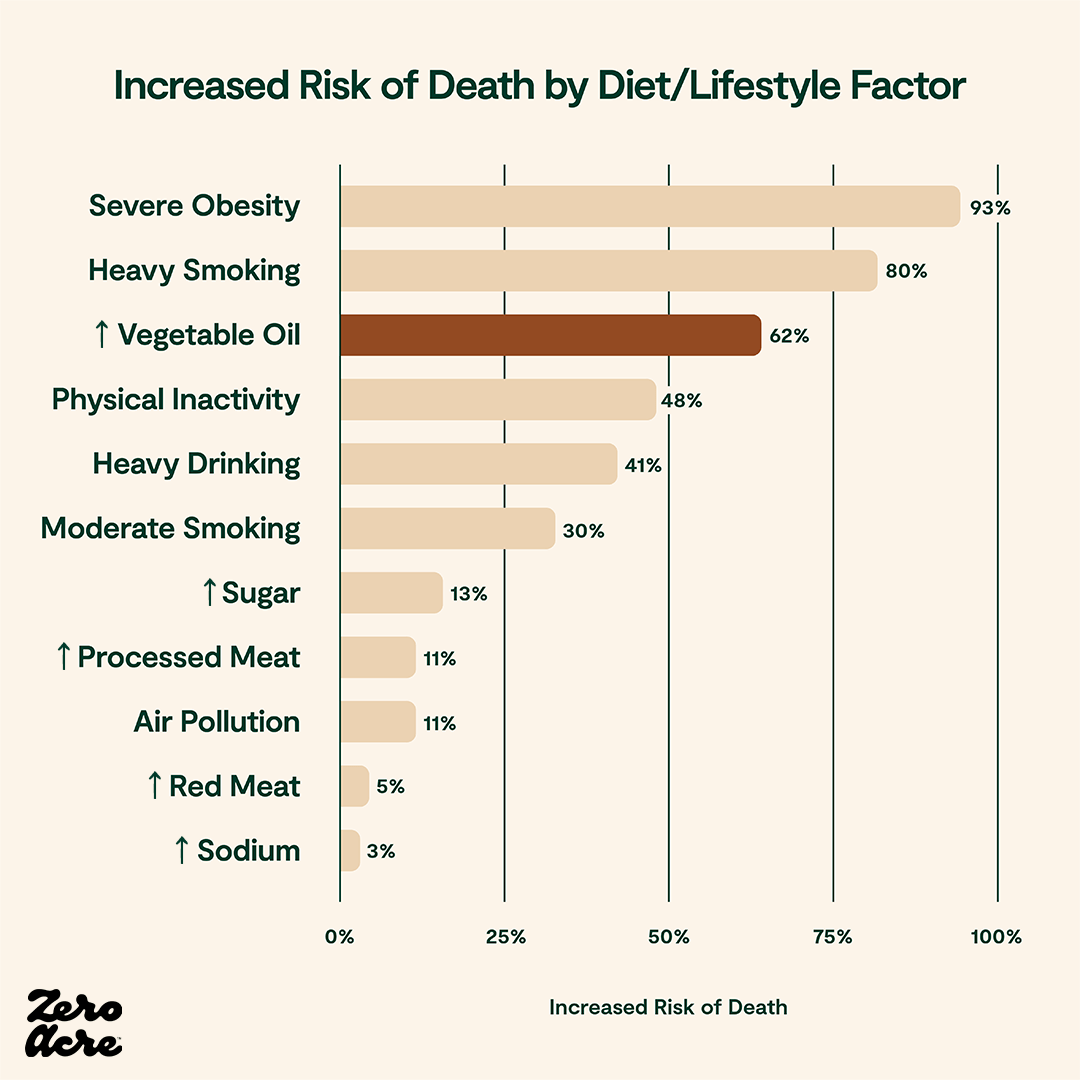
This chart shows that vegetable oil is a factor in early death. Seed oils are one of the WORST foods for long life, because they suppress brain function through damage to DNA, cell membranes, and mitochondria.
Source: www.jeffnobbs.com/posts/death-by-vegetable-oil-what-the-studies-say
Refined Oils Destroy Your Health!
These oils make the cell membranes of the body more rigid, blocking the cells’ ability to absorb nutrients and remove toxins. This quickly triggers degenerative diseases in humans.. Refined oils are an open door for free radicals, which undermine the natural antioxidants in normal healthy foods.
A high level of Linoleic Acid in your body causes accelerated DNA and metabolic damage. This is because Linoleic Acid (LA) has a tendency to oxidize and convert to OXLAMs or OXAAMs. These are Oxidized linoleic acid bioactive derivatives that cause many illnesses, damaging DNA, mitochondria, cell membranes, proteins, and stem cells.
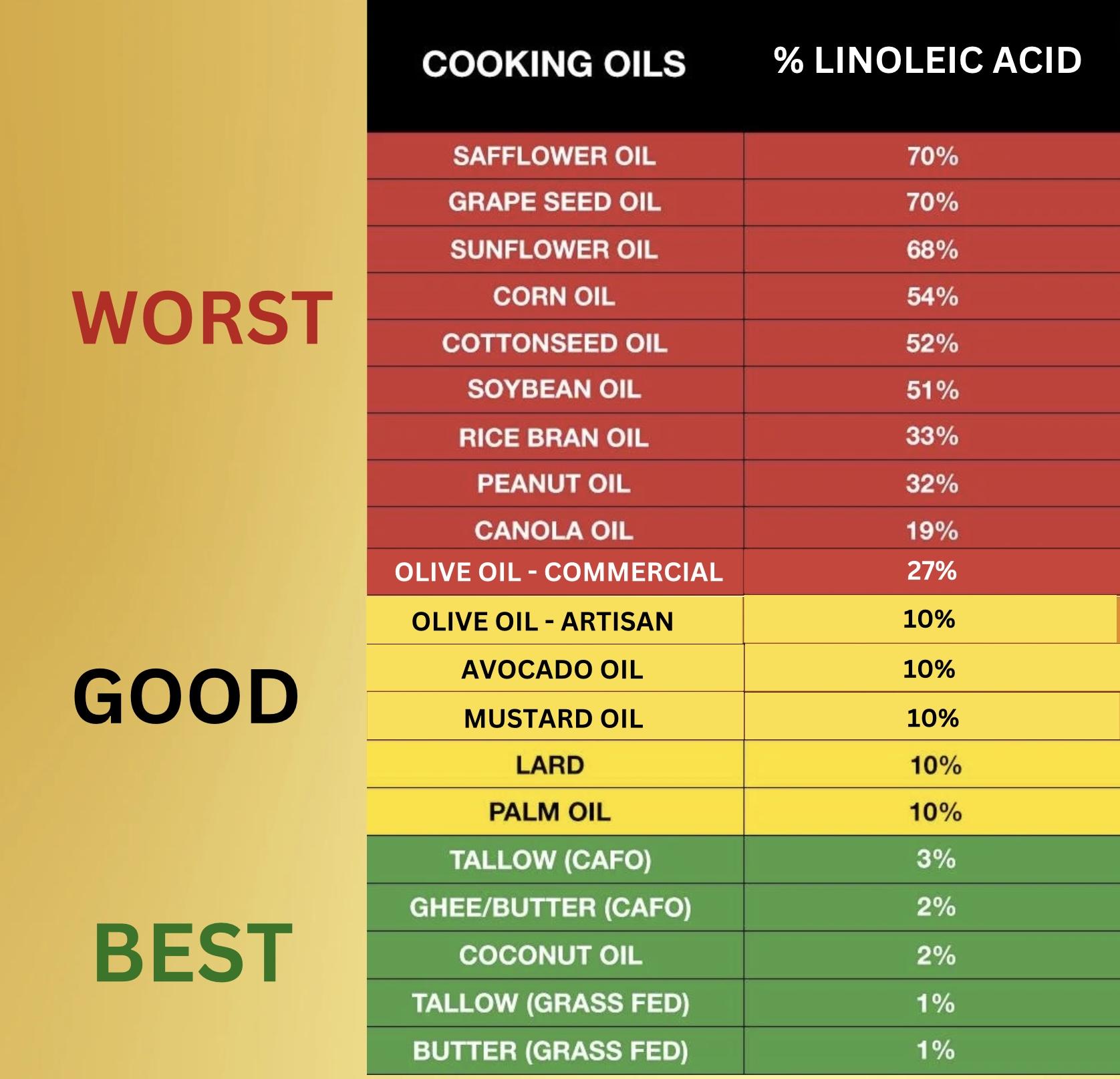 Linoleic Acid and PUFAs are chemically unstable, so they rapidly convert to highly oxidatively reactive metabolites. PUFAs have been shown in studies to cause mitochondrial dysfunction, abnormal inflammation, and endothelial cell damage. The formation of oxidized OXLAMs from refined oils is linked to memory loss and Alzheimer’s disease.
Linoleic Acid and PUFAs are chemically unstable, so they rapidly convert to highly oxidatively reactive metabolites. PUFAs have been shown in studies to cause mitochondrial dysfunction, abnormal inflammation, and endothelial cell damage. The formation of oxidized OXLAMs from refined oils is linked to memory loss and Alzheimer’s disease.
The slow introduction of Genetic Modifications to nature’s food, create biological anomaly’s we are offered bio-synthesized foods that our bodies cannot process. Synthetic food is lower in nutrients than un-tampered plants. GMO foods are raised with large amounts of toxic pesticide and herbicides, further confusing our body microbiome. A new term NGT’s, or “New Genetic Techniques” is a broad term describing all genetic and biological alterations. Monsanto’s toxic glyphosate, for example, is in all GMO refined oils, and 60% of our grocery store foods. Glyphosate is a known carcinogen that destroys the microbiome, causing a variety of diseases including cancer, atherosclerosis, and diabetes. Organic foods are a much better alternative.
What’s the best way to solve the problem?
The best way to prevent damage to our health is to minimize omega-6 consumption. Eliminate from your diet all oils high in linoleic acid oils. Instead, use organic, traditional oils like Grass-fed Butter, Pure Artisan Olive oil, and Mustard oil.
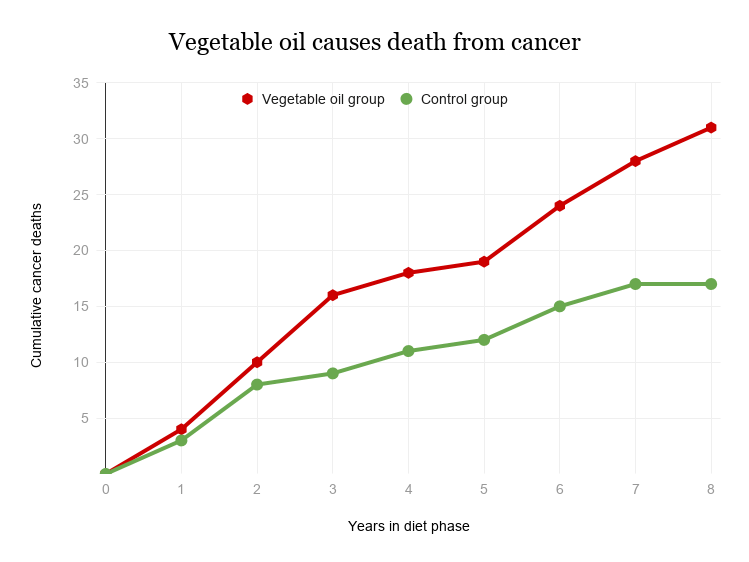
CANCER RISK INCREASES WITH REFINED OILS
In the Los Angeles Veterans Administration Study, the group of participants who increased fat from vegetable oil–while keeping total fat the same–were 82% more likely to die from cancer, compared to the control group that didn’t increase fat from vegetable oil. Despite randomization, the control group consuming less fat from vegetable oil had twice as many heavy smokers, but still experienced significantly fewer cancer deaths. Source: www.jeffnobbs.com/posts/death-by-vegetable-oil-what-the-studies-say
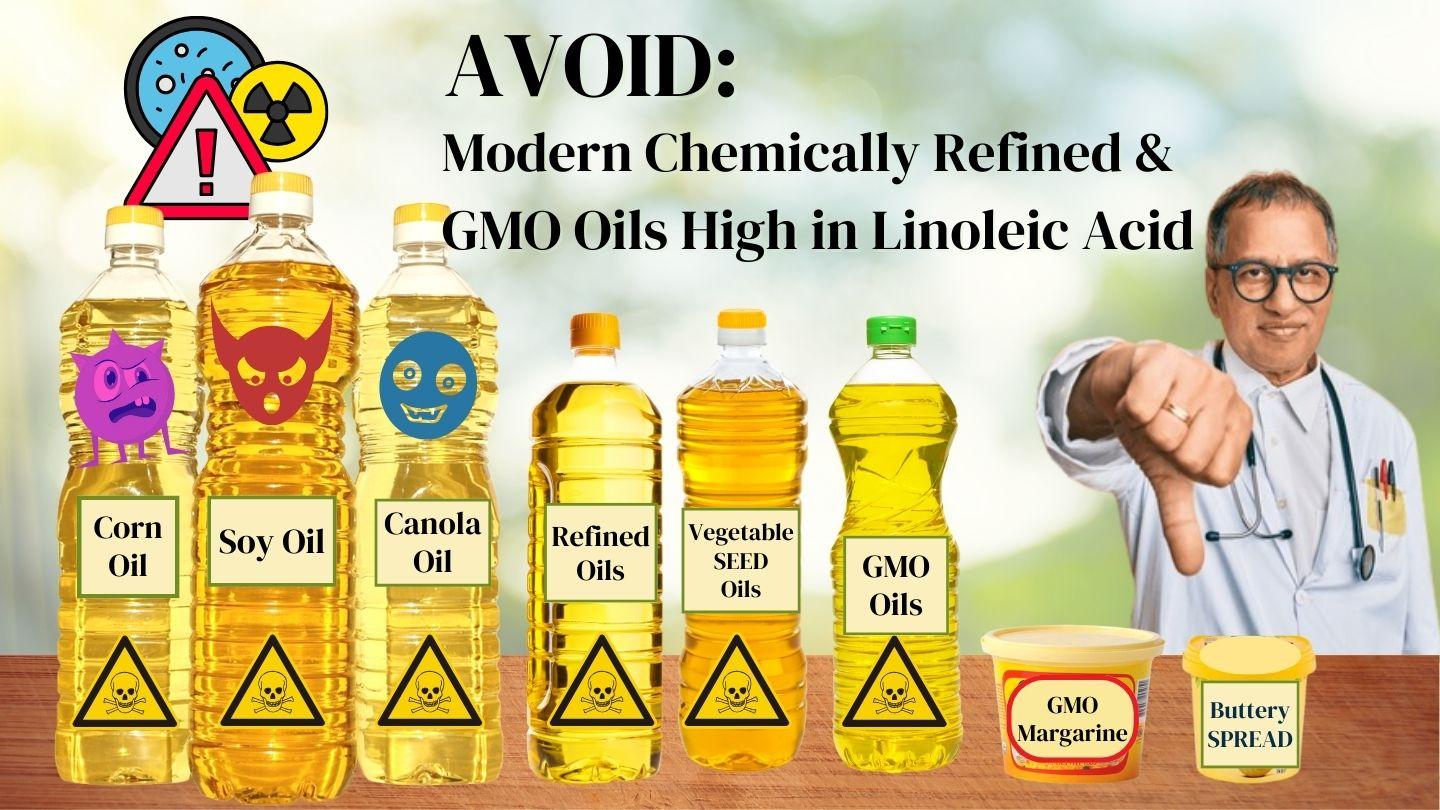
4. AVOID Refined Vegetable Oils HIGH in Linoleic Acid:
Avoid Corn, Soy, Refined, Canola, Margarine, Safflower, Grapeseed, Sunflower, Commercial Olive oil, Sesame, Rice Bran, and Peanut Oil.
- Corn – Corn has been a staple food in the Americas for thousands of years. Now it is all genetically modified, and contains 59% linoleic acid. One of the newest oils, GMO corn that resists glyphosate herbicide was first introduced in 1996 by Monsanto, “Roundup Ready Corn”. Virtually all corn oil on the market is bioengineered and grown with pesticides. Corn is the primary food for farm animals globally. Avoid all Corn oil.
- Soy – The first GMO Glyphosate-resistant soybean was engineered by Monsanto in 1996. Now Soy oil is found in almost everything we eat—from vegetable oil to chocolate bars. Since all soy is GMO bioengineered with 51% linoleic acid, it is toxic to human health.
- Refined Oil – “Refined” is a term used for any oil that has been industrially manipulated. “Refined oil” is usually a blend of various oils (soy, corn, canola, safflower) for marketing purposes. Sadly, it is deceptive term that does not tell you what kind of oil it contains, so I do not recommend it.
- Canola Oil comes from the rapeseed plant when Monsanto researchers in Canada called it “Canola” from “Canada” and “ola” for oil. Canola is one of the newest GMO oils finally registered in 1995 as the first transgenic version of B. napus cultivar, ‘Quest’, tolerant to Monsanto’s herbicide glyphosate (Roundup), developed by Monsanto (now Bayer).
Mainstream media claims Canola oil is “heart healthy”. But Canola oil has been shown to be a heavy destroyer of Vitamin E, which rapidly depletes the body of this important vitamin. Research shows that canola oil causes detrimental changes to blood platelets, and harms mitochondria in cells. It has 21% linoleic acid. - Margarine – Spreadable “Oleomargarine” was created in 1869 by a French chemist Hippolyte Mège-Mouriès, as a less perishable imitation butter made from beef fat. Over time, refined oils such as cottonseed and soybean oils replaced the animal fats. Now most margarine is made from refined GMO corn oil which is very high 58% in linoleic acid. Avoid Margarine.
- Safflower – Safflower oil marketing began in the 1960’s when the industry discovered new methods to refine oil seeds through solvent extraction. Once used as a yellow dye, refined Safflower oil is flavorless and colorless. Sadly, it contains the highest percentage of toxic linoleic acid of any known oil – 78%. Avoid Safflower oil.
- Grapeseed Oil – Grape seed oil has a light taste and very high linoleic acid content of 73%. A by-product of the wine-making industry, it has a relatively high smoke point of approximately 216 °C (421 °F), so many people like it for frying.
- Sunflower oil has a light taste and a very high PUFA linoleic acid content of 68%. Ukraine was once the world’s largest producer of sunflower oil, but the war has caused global prices to increase. Avoid Sunflower oil.
- Commercial Olive oil – Sadly, too many olive oil manufacturers blend olive oil with a tasteless oil such as canola, corn, or soy as a carrier. This disguises the sometimes-bitter taste of low quality olive oil, making the blended oil cheaper and more profitable for the producer. Unfortunately these blended oils are shipped all over the world labeled “Extra Virgin Olive Oil”. This is a warning! If you are sensitive to GMO foods, pesticides, or toxic seed oils, avoid Commercial Olive Oil from any oil manufacturer or restaurant. Instead, opt for butter, coconut oil, or palm oil.
- Sesame – Sesame oil is one of the earliest-known edible oils. Toasted sesame oil tastes divine. Worldwide mass modern production is limited due to inefficient manual harvesting process to extract the oil. Sesame oil contains 54% linoleic acid, so I do not recommend it for daily use.
- Rice Bran – A by-product in rice milling, rice bran oil was once used for animal feed. A recent price war on edible oils has been caused by Indonesia’s restrictions on palm oil exports and disruptions to sunflower oil shipments from Ukraine. This has triggered a surge in demand for rice bran oil. Chemical extraction with hexane yields a colorless oil and a mild taste. Since it contains 39% Linoleic Acid, I do not recommend Rice Bran Oil.
- Peanut Oil – Peanut oil is a popular choice for fried foods thanks to its low cost, versatility, and high smoke point.
- one of the oldest oils in history, extraction methods However, Peanut Oil is prone to oxidation and has a high 32% linoleic acid content. Many children have peanut allergies, so for the above reasons, I do not recommend Peanut Oil.
5. Chemical extraction of oils at high heat creates toxic food.
What’s a Vegetable Oil? Vegetable oil is a marketing term for any extracted seed oil. “Vegetable” sounds better than “seed” or “refined”. However, when you see “Vegetable oil” on the label, you can be sure it is not olive oil or palm oil. It’s just a convenient name to deceptively label a blend of whatever refined oil they want to put in it.
HINT: There are NO VEGETABLES in VEGETABLE OIL. Ha Ha!
Almost all packaged foods and restaurant foods contain toxic refined seed oils such as canola, soy, corn, sunflower oil, and safflower. Refined oils are widely used in commercial salad dressings, mayo, and canned fish. If you look at the ingredients in most prepared and fast foods you will probably see one of these toxic oils.

These industrial seed oils are heated to very high temperature at least five times before packaging. And then the manufacturers claim it’s safe to cook with them! Sadly, all these newly invented unstable oils break down with heat into highly carcinogenic aldehydes. So it’s best to avoid them.
Processing Seed Oils is a multi-step process that is similar for Corn, Soy, Canola, and all Refined Oil Blends.
First the seeds are mechanically crushed at very high temperature several times, and then mixed with petroleum products like hexane gas. In the next step it is ‘desolventized’ to remove the hexane gas. It is then distilled, which produces a gum like byproduct. Then is put through a degumming process in order to remove the gum to become an oil.
The oil then is refined to remove impurities like water, dirt, unwanted matter and color. After that the oil is dried, bleached and deodorized.
The oil is then neutralized by alkali solutions. Finally, various food additives are added to make the oil look clear, beautiful, and to extend shelf life during delivery and its shelf life stores.
This process can be repeated until there is becomes a raw pressed oil and dry pellet with only a little of the original hexane still mixed in it. Any dry material left over is sold as cattle feed, called “cattle cake”.
This chart shows that as Vegetable oil consumption increased, Diabetes and Obesity also increased in the USA. Note that the damage from Vegetable Seed oils is even greater than damage from Sugar!
6. What’s Your Oil Smoke Point? Does Deep-Frying Cause Cancer?
Beware of Frying, as Every Oil has a Smoke Point, a Maximum Temperature where it Burns. When you see smoke, it’s not a good thing. Burnt oil increases cancer risk due to the formation of harmful oxidized chemicals.
If the oil temperature exceeds the smoke point, it causes two problems:
1) Smoking oil means the chemical structure of your oil breaks down and releases harmful chemicals into your food, increasing risk of cancer.
2) When cooking temperature is high, food nutrients and flavor are destroyed.
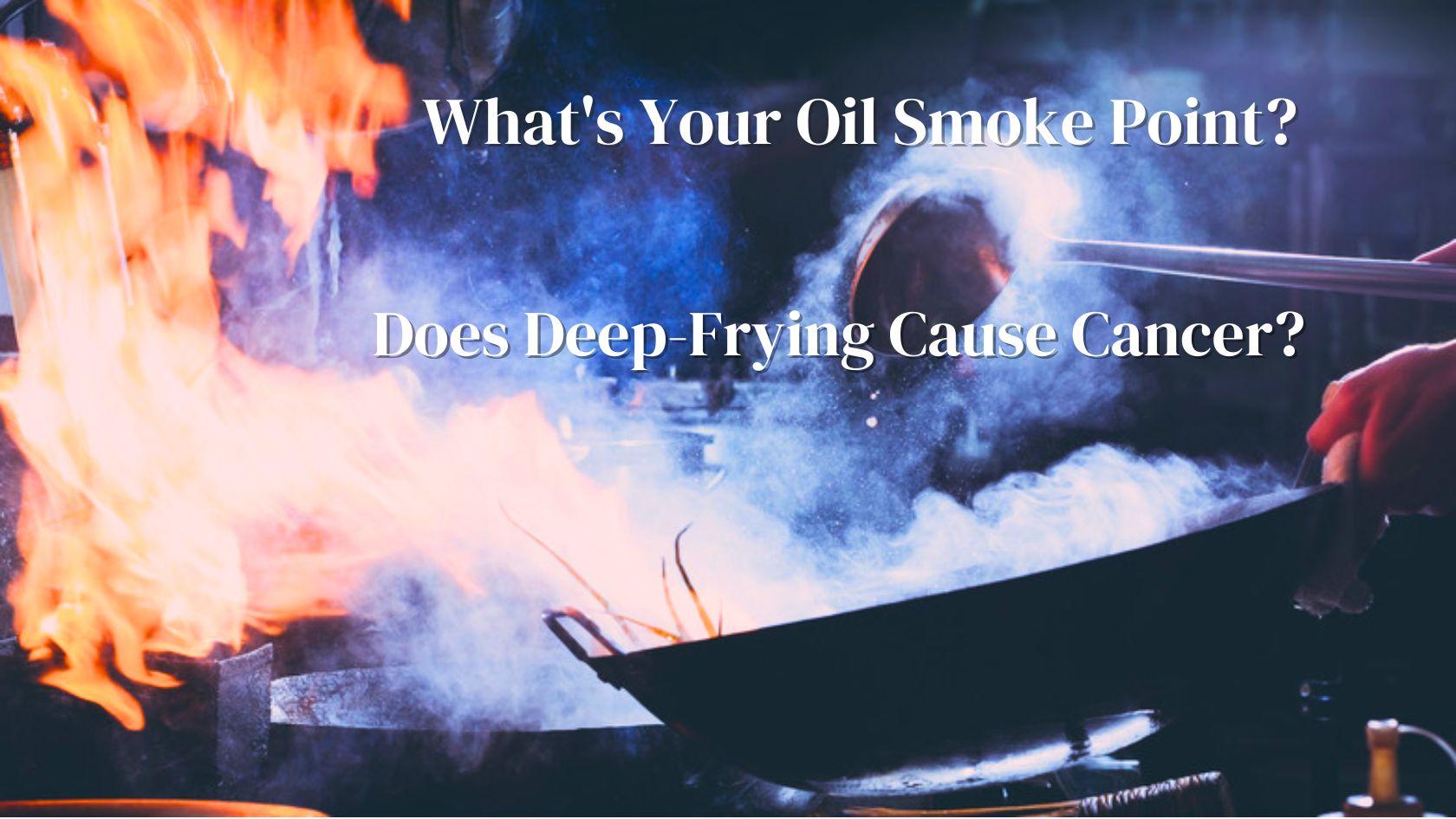
When oils are heated beyond their smoke point during frying or grilling, they undergo a chemical change called oxidation. This can generate harmful compounds like acrylamide. In some parts of the world, high heat cooking is a major cause of nasopharyngeal, esophageal, and lung cancers.
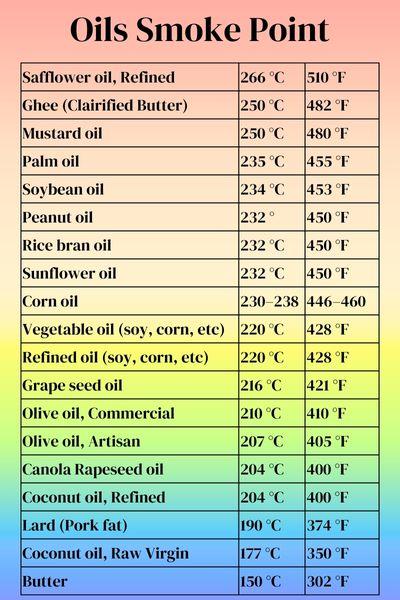 “The lower-risk cooking methods are steaming, boiling, baking, and low-temperature stir frying” says Stephanie Melkonian, a post-doctoral fellow at the MD Anderson Cancer Center and a co-author of a new study in Cancer.
“The lower-risk cooking methods are steaming, boiling, baking, and low-temperature stir frying” says Stephanie Melkonian, a post-doctoral fellow at the MD Anderson Cancer Center and a co-author of a new study in Cancer.
Harmful chemicals like Heterocyclic amines (HCAs) and polycyclic aromatic hydrocarbons (PAHs) are formed when muscle meat like beef, pork, fish, or poultry, is cooked at high-temperatures such as pan frying or grilling directly over an open flame. As the National Cancer Institute explains, HCAs “have been found to be mutagenic — that is, they cause changes in your DNA that may increase the risk of cancer.”
Cooking oil fumes increase your risk of lung cancer regardless of smoking status. Poor ventilation in the kitchen may also increase the risk of lung cancer.
Never Reheat or Reuse oil. This is harmful for health.
Many people, especially restaurants, use cooking oil for deep frying and then re-use the oil in other dishes or more deep frying. This is extremely harmful. Reheating or reusing oil releases free radicals, unstable atoms that cause illness and early ageing. Reheated or reused oil is carcinogenic. While it might seem wasteful to throw away leftover oil can lead to cancer and huge medical bills.
Final Tips for Healthy Cooking with Oil:
- Be aware of the smoke point of your cooking oil.
- Never burn the oil to the point where it smokes.
- Frying destroys nutrients in food. It’s better to steam, boil, bake, or low-temperature stir-fry.
- Never reuse your oil after cooking.
 Srijana, aka Jane Barthelemy, is a medical intuitive, author, and healer. Srijana has her MBA in financial management and has practiced Tibetan Buddhist meditation for over five decades, residing in the Rudrananda Ashram in the USA for 35 years. She practices kinesiology, craniosacral therapy, Acunect, and BodyTalk – an infusion of Chinese – Ayurvedic wisdom. She is trained in Qigong, Taichi, Daoist sexuality, and Kundalini activation. Her medical Qigong training is with Mantak Chia, Khamto Lee, Daniel Villasenor, Zhongxian Wu, Dr. Ka’imi Pilipovich, Franco Mescola, Richard Leirer, and Lam Kam Chueng. She has her BS in Italian Opera and MBA. Her two paradigm-changing cookbooks show how to build health with unprocessed foods. Her upcoming books include: “Heal Your Past Lives”, and “Buddha Speaks – Channeled Passages from the Master”. She is on the faculty of NewEarth University and LearnDesk. Her websites are FiveSeasonsMedicine.com and JanesHealthyKitchen.com. Srijana lives in Bhutan with her Bhutanese husband, D. Thinley.
Srijana, aka Jane Barthelemy, is a medical intuitive, author, and healer. Srijana has her MBA in financial management and has practiced Tibetan Buddhist meditation for over five decades, residing in the Rudrananda Ashram in the USA for 35 years. She practices kinesiology, craniosacral therapy, Acunect, and BodyTalk – an infusion of Chinese – Ayurvedic wisdom. She is trained in Qigong, Taichi, Daoist sexuality, and Kundalini activation. Her medical Qigong training is with Mantak Chia, Khamto Lee, Daniel Villasenor, Zhongxian Wu, Dr. Ka’imi Pilipovich, Franco Mescola, Richard Leirer, and Lam Kam Chueng. She has her BS in Italian Opera and MBA. Her two paradigm-changing cookbooks show how to build health with unprocessed foods. Her upcoming books include: “Heal Your Past Lives”, and “Buddha Speaks – Channeled Passages from the Master”. She is on the faculty of NewEarth University and LearnDesk. Her websites are FiveSeasonsMedicine.com and JanesHealthyKitchen.com. Srijana lives in Bhutan with her Bhutanese husband, D. Thinley.
Resources:
- https://www.cbc.ca/news/business/palm-oil-consumer-products-labelling-1.6764199
- https://www.bbc.com/future/article/20200109-what-are-the-alternatives-to-palm-oil
- https://www.sciencedirect.com/science/article/pii/S2161831324001108
- https://www.ncbi.nlm.nih.gov/pmc/articles/PMC10386285/
- https://finance.yahoo.com/news/bill-gates-led-fund-invests-121955937.html
- Diet, Brain Lipids, and Brain Functions: Polyunsaturated Fatty Acids, Mainly Omega-3 Fatty Acids, https://link.springer.com/referenceworkentry/10.1007/978-0-387-30378-9_17
- Rich Diet on Central Nervous System Development, https://www.mdpi.com/2072-6643/16/7/1093
- https://spiceborii.com/product-tag/non-gmo-mustard-oil/
- Nutrition in Brain Development and Aging: Role of Essential Fatty Acids, https://onlinelibrary.wiley.com/doi/pdf/10.1111/j.1753-4887.2006.tb00242.x
- VADAKAYIL says MODI WANTS TO REDUCE INDIAN BRAIN POWER AND REDUCE FERTILITY BY PUSHING TOXIC GMO MUSTARD OIL- POLL, https://captajitvadakayil.in/2022/10/27/vadakayil-says-modi-wants-to-reduce-indian-brain-power-and-reduce-fertility-by-pushing-toxic-gmo-mustard-oil-poll/
- https://finance.yahoo.com/news/bill-gates-led-fund-invests-121955937.html
- Linoleic Acid: A Narrative Review of the Effects of Increased Intake in the Standard American Diet and Associations with Chronic Disease, https://www.ncbi.nlm.nih.gov/pmc/articles/PMC10386285/
- https://foodprint.org/blog/cooking-oils-and-sustainability/
- https://www.forbes.com/sites/johncumbers/2022/12/22/c16-biosciences-has-built-a-palm-oil-farm-in-midtown-manhattan-to-stop-global-deforestation/
- https://366solutions.com/22-/05-/2021/264-palm-oil-synthetic/
- https://news.mit.edu/2023/clean-alternative-palm-oil-replacement-0622
- Danger ahead as GM Mustard gets a go ahead; matter before the apex court, https://www.gaonconnection.com/english/gm-mustard-controversy-explained-supreme-court-genetically-modified-organic-farming-oil-food-production-opinion-51452/
- https://theconversation.com/whats-the-latest-on-gmos-and-gene-edited-foods-and-what-are-the-concerns-an-expert-explains-204275
- https://theconversation.com/how-crisco-toppled-lard-and-made-americans-believers-in-industrial-food-127158
- https://theconversation.com/how-palm-oil-became-the-worlds-most-hated-most-used-fat-source-161165
- https://www.youtube.com/watch?v=KwI4eMFBpFA
- Dr. Barbara O’Neill’s Natural EYE-HEALING SECRETS That Eye Doctors Won’t Share, https://www.youtube.com/watch?v=KwI4eMFBpFA
- Why Am I Still Sick? The Silent Role of Biofilms in Chronic Disease (Full Movie)
- https://www.youtube.com/watch?v=BjHqMZszHTA
- Linoleic acid–good or bad for the brain?, https://www.nature.com/articles/s41538-019-0061-9
- How Linoleic Acid Wrecks Your Health, https://media.mercola.com/ImageServer/Public/2021/November/PDF/linoleic-acid-health-effects-pdf.pdf
- The Skinny on Fats, by Mary G. Enig, https://www.westonaprice.org/health-topics/know-your-fats/the-skinny-on-fats/#gsc.tab=0
- Essential Fatty Acids, https://lpi.oregonstate.edu/mic/other-nutrients/essential-fatty-acids
- Importance of maintaining a low omega–6/omega–3 ratio for reducing inflammation, https://openheart.bmj.com/content/5/2/e000946
- The Top Ten Paleo Supplements, https://jackkruse.com/top-ten-paleo-supplements/
- Quebec professor’s drink to treat mild cognitive impairments in older adults hitting store shelves, https://www.ctvnews.ca/health/quebec-professor-s-drink-to-treat-mild-cognitive-impairments-in-older-adults-hitting-store-shelves-1.5167186
- Top 11 DHA Benefits for the Brain, Skin, Eyes & More, https://draxe.com/nutrition/dha/
- Here’s How to Determine the Healthiest Fats to Cook With,https://drhyman.com/blogs/content/heres-determine-healthiest-fats-cook
- https://nourishingtraditions.com/all-those-new-oils/
- List of Good Fats and Oils versus Bad, https://drcate.com/list-of-good-fats-and-oils-versus-bad/#smoke-point



